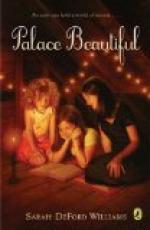There she once more opened the old davenport, and took from it the thick packet, which contained a shabby little desk, inside of which lay a letter directed to herself.
Now at last she opened the letter, and in her own great perplexity read the message from the grave.
The letter was dated about three months back, and was in her mother’s neatest and most easily read writing.
“My dear daughter,” it began, “I have no present reason to suppose that my life will be cut short, therefore I cannot tell whether this letter will be read by you now, while you are young, or years hence, when your youth is over.
“One thing I have resolved—you shall not know the little secret it contains during my lifetime. I keep it from you, my darling, because I could not bear you to speak of it to me, because at the time it gave me such agony that I have locked it up in my heart, and no one, not even my own child, must open the doors where my dead secret lies.
“Primrose, whenever I die, this letter will reach you—you will find it in the ordinary course of things in my cabinet; but even in this letter I cannot tell you all the story—you must go to Hannah for particulars—she has been with me all my married life, and knows as much as I do.
“Once, when you were a little child of only six years old, I came into the room where you slept, and I heard her saying to you, as she tucked you up for the night—
“You must be very good to your mamma, Miss Primrose, for she has known trouble.”
“Neither you nor she saw me, and you raised your dear eyes to her face, and I heard you say—
“‘What is trouble, nursey Hannah?’
“‘Trouble is a burden too heavy to be borne,’ Hannah answered, ’but when you came, Missy, it went away—you were like the spring to my missus, and that is why she called you Primrose.’
“That night I called Hannah aside, and I made the faithful creature promise that she would never again allude to my trouble to any of my children. She promised, and kept her word.
“Now, darling, you shall learn what nearly broke my heart; what would have quite broken it had God not sent me my three girls.
“Primrose, something more bitter than death came to your mother. Your father is dead—I know where his bones lie—I know that I shall meet him again, and I don’t rebel. My other trouble was far, far worse than that—
“Darling, you are not my eldest child—you are not the first bonny baby who lay in my arms. Years before you were born I had a son. Oh! how can I speak of him?—he seemed to be more beautiful than any other child—he had ways—he had looks—Primrose, I can’t go on, you must ask Hannah to tell you what my boy was like. I had him for five years, then I lost him; he did not die—he was stolen from me. Can you wonder now that your mother sometimes looks sad, and that even you and Jasmine and Daisy fail now and then to make me smile?




